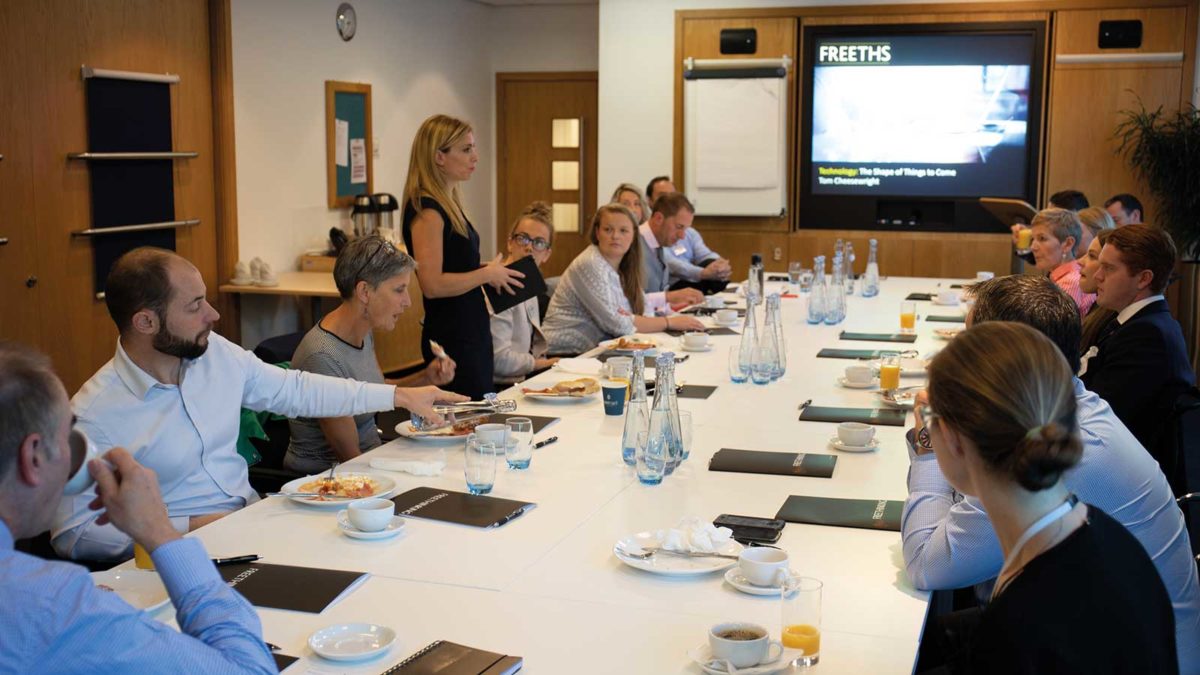
The Shape of Things to Come
In Issue 53 of B4 we covered Freeths’ roundtable discussion at Pembroke College where we first met Tom Cheesewright, the founder of applied futurism practice, Book of the Future and creator of the Applied Futurist’s Toolkit, a suite of strategy and storytelling tools for agile organisations. Tom recently visited Freeths’ offices to present about life after Brexit and how his clients, including large multinationals, rarely discuss the ‘B’ word and that this presentation was something of a first.
“I am an applied futurist and I work mainly for large corporations like BP and HSBC and various public bodies. I work with them to answer three questions:
What does our future look like?
How do we tell that story to our colleagues and our customers and in some cases our shareholders and future employees?
The thorny question – what on earth do we do about it?
“I do this in a number of ways. Sometimes I will do a talk like this to the board or the leadership team or the sales teams to inspire some different thinking. Sometimes I will go in and do some more detailed work, consulting with them, developing ideas and strategies. Sometimes they will come to me and I will teach them how to do it for themselves. So people like Sky and Bacardi will come and find out more about the tools that I use in my job to take back to their businesses.
“Amazingly, the one thing they have never asked about very little is Brexit. It has been raised in the Q&A at the end of talks but this is the first time I have been formally asked to talk about Brexit. The reason is quite surprising, best illustrated by an anecdote. Just after the referendum, I was doing a talk for the UK workforce of a very large German corporation, who have been a client for a few years. The vote has come in, and it’s not gone the way a lot of people expected. There were three hundred sales people in the room and I’m about to get up on stage and tell them that the biggest driver for change in the future is technology.
“I’m a bit nervous about this because this is a company that is potentially going to have to re-do all of the certifications for its products, re-organise all of their trade deals, re-think all of the tax implications and do a huge amount of work and it’s going to directly impact the three hundred people that I’m about to address. Their deals, their margins, their bonuses.
“This company is big enough to have its own Head of Foresight and I actually grabbed him and took him to one side and said, ‘look, I still believe in what I’m going to say but I’m slightly nervous about this. I’m about to stand and tell these people that have had a massive shock in the political domain that technology is going to be the biggest driver of change in their future.
“He said, ‘no, no we completely agree. It’s a pain, but we just have to deal with it. All of our strategic planning is focused on what technology will do for our business in the long term not what Brexit will do in the short term.’
“And I’ve heard that sentiment over and over and over again. There are exceptions, of course. You may have heard the Chief Executive of Jaguar Land Rover, Ralf Speth, recently at the Electric Vehicle conference where Theresa May announced the spectacular sum of £106 million towards making us a global leader in electrical vehicles. It sounds an impressive number, but on a global scale probably pales in comparison with what someone like China is ploughing into this. For example, one state in China leant £65 million to one company to increase the use of robots in its business and we’re talking about a national programme which is supposed to be transformative for £100 million!
“Speth thinks a no deal Brexit could cost us £1.2 billion. There are companies here who are exporting for whom this issue might be higher up the agenda. But for most of my global clients it is difficult, it is challenging and they are beating up the government over the uncertainty – for example, you may have Jürgen Maier, the UK chief executive of Siemens, talking about it this summer. It’s a challenge but for most, it’s not the biggest challenge they are facing.
“Nonetheless, it’s an important and challenging issue and it’s one we are all going to have to face. And it’s something none of us can really plan for at the moment. There is a great deal of uncertainty about who is going to be PM in six months time, what sort of deal will be proposed, what deal Europe will accept. But I can talk in terms of what the whole movement will mean. What it will mean to build more walls and break down connections. What it will mean to us to be separated away from this entity.
“One of the analogies that came to mind when looking at the whole situation and trying to understand it was the story of King Canute. We all think we know the story of King Canute and the tide. How this arrogant king set himself against the sea and commanded it not to come in and was rather shocked and surprised when the tide disobeyed him and flowed around the legs of his throne.
“I think a lot of our politicians and a lot of our leaders feel a little ‘Canute like’ at the moment. They’re not railing at the EU and what the EU may or may not do, they are railing at a much bigger tide, a much wider tide of change which has been happening for many years and one which will continue to happen whether or not there is a Brexit, no deal or otherwise. That tide is one of a shrinking world, of a level of globalisation and interconnectivity that isn’t about capitalism or about free market thinking but is largely underpinned by technology, first of all transport and, more recently, digital communications. We live in a world which is hyper-connected where I can source products, services, whatever I want from just about anywhere in the world in the space of a few clicks or maybe a few voice commands to Alexa.
“Whatever we do in terms of Brexit and whatever Donald Trump does in terms of building walls and setting protectionist tariffs against China, we’re not going to reverse that trend. Not, as I say, because of some sort of global, free market conspiracy. It’s simply that our ability to move product, connect and communicate is moving at such an exponential rate.
“There was a really interesting book a couple of years ago by Parag Khanna who is the Founder & Managing Partner of FutureMap. He wrote, or rather drew, a book called ‘Connectography’. It was a very visual book about re-mapping the world, not in terms of our historical ideas of geography but in terms of our connections between places. There was a very trite but simple and illustrative statistic which came out of it which is that there are now significantly more miles of connections than borders. Historical ideas of geography and space and place have broken down, in large part by our ability to move things very quickly, and more recently by our ability to move ideas and money very quickly.
“So our politicians, and certainly those that believe in Brexit, have somewhat set themselves to face this tide. There may good reasons to do that, from both sides. But this tide overwhelms us, ultimately.
“The real story of King Canute, who was known as ‘Canute the Great’ is that he set himself against the sea to demonstrate his lack of strength. When the sea didn’t stop he said to his followers ‘God is much more powerful than me, I have my limitations.’ I think some of our leaders are much more like this Canute. They are not necessarily doing this to demonstrate their humility, but they are absolutely aware of what is going to happen. They cannot hold back the tide but they are willing to go in to it to hold on to what power they have. When the tide comes in, they will say ‘it was the will of the people that overcame all.’
“As I said at the beginning, exactly what will happen remains uncertain. But uncertainty is increasingly the new normal. I work with clients to help them to cope with uncertainty and respond rapidly as soon as there is clarity. Part of this is about structure. The new generation of global giants are constructed very differently to the large companies of the past. They are networks of smaller components that can be constantly reconfigured to help them move quickly and adapt. Amazon is a prime example: every internal function of the company is wrapped in a layer of software making it into a stack of virtual Lego bricks. New businesses like Amazon Wine can be assembled by bolting one new brick to the existing services. And just as easily shut down if that idea doesn’t work.
“Another key component of being adaptable is about vision. Clients often struggle with medium term plans over the next 18 months to five years. They are fine with the a vision or the next financial period, but beyond that, and beyond their own limited knowledge of their specific industry, they struggle. With uncertainties like Brexit but more often with the changes forced on us by technology, we are being challenged to change more quickly.
“If you want to overcome uncertainties in the future, you need to look for the external factors that are driving macro-level changes. Look beyond issues like Brexit to the bigger issues concerning global companies: primarily how technology is transforming their business. Look at the new choice and competition technology creates. Look at how it’s amplifying the power and productivity of each person in the business. Look at rising expectations for customer service and the speed of business decision-making. And look at the changing shape of our organisations, shifting from monoliths to networks. Consider these things and think about how they intersect with the issues in your business today. What are the points of friction you are facing, slowing you down, making you less efficient? Where these issues intersect with the macro trends is where you will find the next five things you need to focus on.”
More in Education
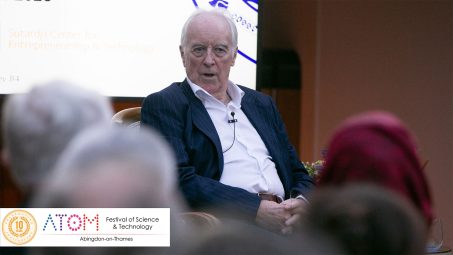
Stephen Clarke: Leading the Way at the ATOM Festival of Science...
Stephen Clarke, our Principal at Cherwell College Oxford, is not only a distinguished leader and former British diplomat, but also a passionate advocate for science and education. As the Chairman of ATOM Festival of Science & Technology, Stephen plays a pivotal role in bringing world-class scientific discussions and innovations to the heart of Abingdon. Stephen’s leadership ensures that the festival remains dynamic, inclusive, and engaging for people of all ages.
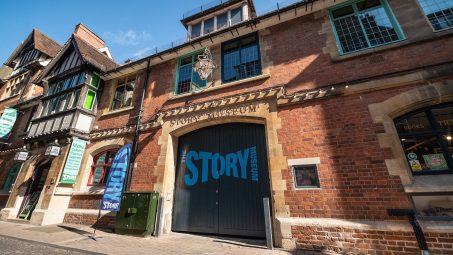
The Story Museum: Bringing Stories to Life in Magical Ways
The Story Museum is no ordinary museum. Nestled in the heart of Oxford, this unique, immersive space is dedicated to celebrating the power of storytelling in all its forms. Whether through interactive exhibitions, live performances, or creative workshops, The Story Museum is on a mission to enrich lives—especially young lives—through the magic of stories.

Unleash Your Potential: AI & Innovation Summer Camp at Cherwell College...
In an ever-evolving world where innovation drives progress, equipping oneself with cutting-edge skills becomes paramount. Cherwell College Oxford proudly presents its AI & Innovation Summer Camp, a transformative journey designed to empower young minds with the tools and insights needed to thrive in the digital age. Here’s why this programme is a must for aspiring innovators:
From this author

Freeths appointed to Cottsway’s legal panel
Leading law firm Freeths has been appointed as a new supplier to Cottsway Housing Association’s legal panel for the next five years.
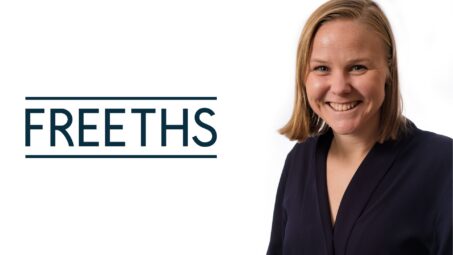
Freeths advises Veriflo on its sale to Celnor Group
National law firm Freeths has advised the shareholders of Veriflo Limited on its sale to Celnor Group.
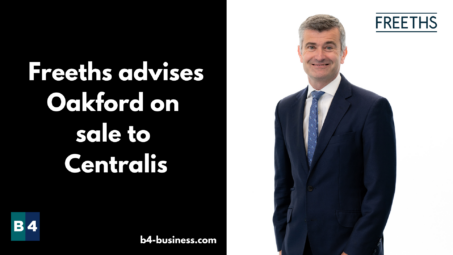
Freeths advises Oakford on sale to Centralis
National law firm Freeths has advised the shareholders of Oakford Advisors on its sale to Luxembourg-based Centralis.

